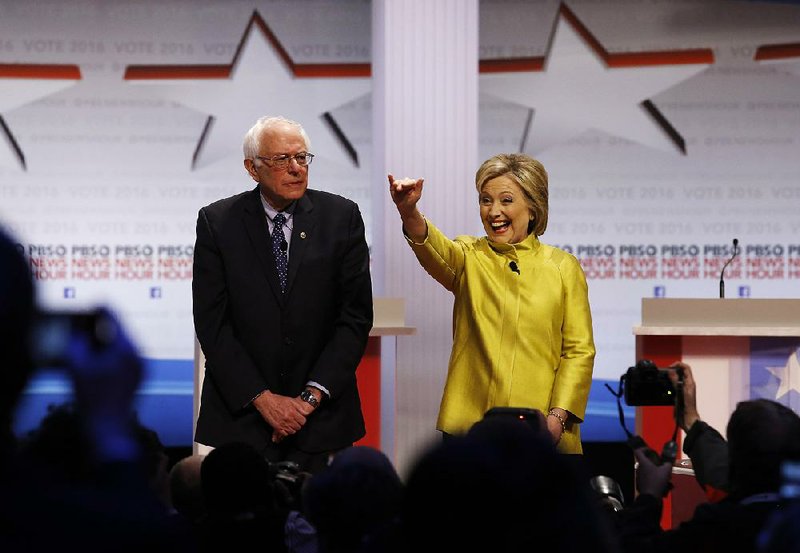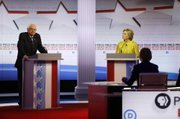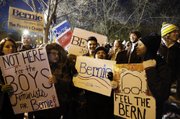MILWAUKEE -- Hillary Clinton and Bernie Sanders battled for the support of black and Hispanic voters in Thursday night's Democratic debate at the University of Wisconsin-Milwaukee, ahead of contests in states with more minority-group voters.
RELATED ARTICLE
http://www.arkansas…">GOP runners jab, look for key to S.C. victory
FULL ELECTION COVERAGE
After splitting the first two states with Sanders, Clinton deepened her assertion that her fellow candidate was energizing voters with promises "that cannot be kept." And she continued to closely align herself with President Barack Obama, who remains popular among black Democrats.
Seeking to boost his own support with members of minority groups, Sanders peppered his typically economic-focused responses with calls to overhaul a "broken criminal justice system."
"At the end of my first term, we will not have more people in jail than any other country," he said.
He said he would also decriminalize marijuana and demilitarize and diversify local police departments.
In one of many moments of agreement between the candidates, Clinton concurred on a need to address a criminal justice system that incarcerates a disproportionate number of minority-group members. But she cast her proposals for fighting racial inequality as broader than his.
"We're going to emphasize education, jobs and housing," said Clinton, who was endorsed earlier in the day by the political action committee of the Congressional Black Caucus.
But the pair clashed over their voting records on a 2007 immigration-overhaul bill when they both were serving in the U.S. Senate.
Sanders voted against the bill, saying in the debate that he did so over humanitarian concerns related to guest worker provisions that he says were akin to slavery.
Clinton voted for the bill.
The candidates both vowed to pursue comprehensive immigration change, using the issue to draw a contrast with Republicans who oppose allowing many of the millions of people in the United States illegally to stay. Both disagreed with a new series of raids authorized by Obama to arrest and deport some people from Central America who recently came to the country illegally.
"We should be deporting criminals, not hardworking immigrant families who do the very best they can," Clinton said, adding that she hopes "some of the Republicans will come to their senses and realize we will not deport 11 to 12 million people in this country."
Sanders chimed in: "We have got to stand up to the Trumps of the world who are trying to divide us up," referring to Republican candidate Donald Trump, who has called for deporting everyone in the country illegally and constructing a wall along the U.S.-Mexico border.
Clinton worked to offset Sanders' backing from young Americans by drawing support from the black and Hispanic voters who make up a big share of the electorate in Nevada, South Carolina and other states that come next on the primary calendar. March 1 brings a slew of Southern states, including Arkansas, in voting contests known as Super Tuesday.
The former secretary of state sought to discredit some of the proposals that have drawn young people to Sanders, including his call for free tuition at public colleges and universities and a plan for a government-run, single-payer health care system.
"I know a lot of Americans are angry about the economy, and for good cause," she said in her opening statement. "There aren't enough good-paying jobs, especially for young people. And, yes, the economy is rigged in favor of those at the top."
Clinton said those proposals come with unrealistic price tags. And she accused Sanders of trying to shade the truth about what she said would be a 40 percent increase in the size of the federal government in order to implement his policies.
Sanders didn't put a price on his policies, but neither did he shy away from the notion that he wants to expand the size of government.
"In my view, the government of a democratic society has a moral responsibility to play a vital role in making sure all our people have a decent standard of living," Sanders said.
Sanders has focused his campaign almost exclusively on a call to break up big Wall Street banks and overhaul the current campaign finance system that he says gives wealthy Americans undue influence. His campaign contends that his message will be well-received by minority voters, arguing that blacks and Hispanics have been hurt even more by what he calls a "rigged" economy.
Clinton has been criticized for not being able to encapsulate her reasons for running in just a sentence, but she attempted to do so Thursday. "I'm running for president to knock down all the barriers that are holding Americans back and to rebuild the ladders of opportunity that will give every American a chance to advance, especially those who have been left out and left behind," she said.
A majority of women voting in the New Hampshire Democratic primary sided with Sanders, and Clinton told Thursday's national audience that she would keep fighting to get their support.
"I have spent my entire adult life working toward making sure that women are empowered to make their own choices, even if that choice is not to vote for me, I believe that it's most important that we unleash the full potential of women and girls in our society," she said. "I have no argument with anyone making up her mind about who to support. I just hope that by the end of this campaign, there will be a lot more supporting me. That's what I am working toward."
Clinton also noted that the debate, moderated by PBS' Gwen Ifill and Judy Woodruff, was an historic moment: Out of more than 200 presidential primary debates, Thursday's was the first in which a majority of the people -- three of four -- were women. "So, you know, we'll take our progress wherever we can find it," she said.
Sanders said he didn't worry about thwarting what would be an even more historic moment if Clinton were to be elected the first woman president, explaining that his election also would be historically significant. "From an historical point of view somebody with my background, somebody with my views, somebody who has spent his entire life taking on the big money interests, I think a Sanders victory would be of some historical accomplishment as well," he said.
Sanders said he, too, has a record of fighting for women and that there is no question that women's rights are "under fierce attack," particularly from Republicans debating abortion rights.
He said Republicans love to campaign on cutting government influence for the good of the people, but "when it comes to a woman having to make a very personal choice" on abortion, they want government to make that choice.
"If that's not hypocrisy, I don't know what hypocrisy is," he said.
The two closed the debate sparring over their support for Barack Obama.
Sanders had suggested Obama hadn't succeeded in closing the gap between Congress and the American people.
Clinton, who served as Obama's first secretary of state, accused Sanders of diminishing the president's record and shortchanging his leadership.
"The kind of criticism I hear from Sen. Sanders, I expect from Republicans. I do not expect it from someone seeking the Democratic nomination," Clinton said at the close of the two-hour debate.
Sanders responded: "Madam Secretary, that is a low blow." And he noted that Clinton was the only one on the stage who ran against Obama in the 2008 presidential race.
Black caucus endorsement
Hours before the debate, the Congressional Black Caucus political action committee endorsed Clinton, who along with her husband have spent decades building ties in the black community.
Some black lawmakers are seeking to close ranks around Clinton as Sanders, who represents a mostly white state, works to make inroads with minority-group voters, in part, by talking about his time protesting segregated housing at the University of Chicago.
U.S. Rep. G.K. Butterfield, D-North Carolina, the Black Caucus chairman, said no candidate "understands the racial divide" as well as Clinton does.
Butterfield dismissed candidates who "just promise wonderful things, but things that are politically impossible to achieve."
U.S. Rep. John Lewis, D-Ga., a civil-rights icon, on Thursday dismissed Sanders' role in the civil-rights movement.
"I never saw him, I never met him," he said at the Congressional Black Caucus PAC endorsement event. "I'm a chairman of the Student Nonviolent Coordinating Committee for three years, from 1963 to 1966. I was involved in the sit-ins, the freedom rides, the March on Washington, the march from Selma to Montgomery, and directed their voter education project for six years. But I met Hillary Clinton. I met President [Bill] Clinton."
The former president himself, visiting Memphis on Thursday night for an early-voting rally, sought to energize supporters of his wife by presenting highlights of her presidential platform and calling her a "change-maker."
Bill Clinton addressed a racially mixed group of about 500 at Whitehaven High School, laying out some of Hillary Clinton's goals, including raising the minimum wage, job creation, voting-rights protection and providing affordable college tuition and health care.
The former president said reaching those goals "requires a president who knows how to stand her ground and how to seek common ground."
"We've got to go forward together. We can do this," he said, prompting applause from the crowd.
Early voting for Tennessee's March 1 primary began Wednesday.
The Clintons' daughter, Chelsea, offered her own take on the campaign so far. She was asked whether she had a sinking feeling now or whether she saw parallels to the 2008 Democratic primary contest, where her mother began as the front-runner but lost to then-Sen. Obama.
"I didn't have a sinking feeling eight years ago, and I don't now," Chelsea Clinton said. "I don't think of the world that way."
Chelsea Clinton was visiting a pediatric clinic and a pipefitters union hall in Flint, Mich., where the city's drinking water became tainted with lead after state officials switched the city's water supply in an effort to trim its budget. The city has a large black population, and Hillary Clinton has sought to make it an example of how black communities receive unequal treatment from government.
"I have a 16-month-old daughter, I'm pregnant with my second child, and I couldn't even imagine the trauma knowing that my child was a victim, not because I did anything, but because of where I live?" Chelsea Clinton said. "I just can't imagine that."
Information for this article was contributed by Jennifer Epstein, Margaret Talev, Arit John, David Knowles and Elizabeth Campbell of Bloomberg News; by Julie Pace, Catherine Lucey and Adrian Sainz of The Associated Press; and by David A. Fahrenthold of The Washington Post.
A Section on 02/12/2016



